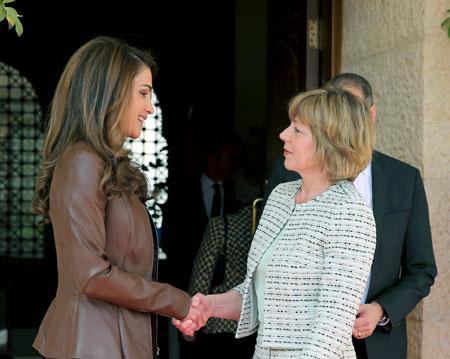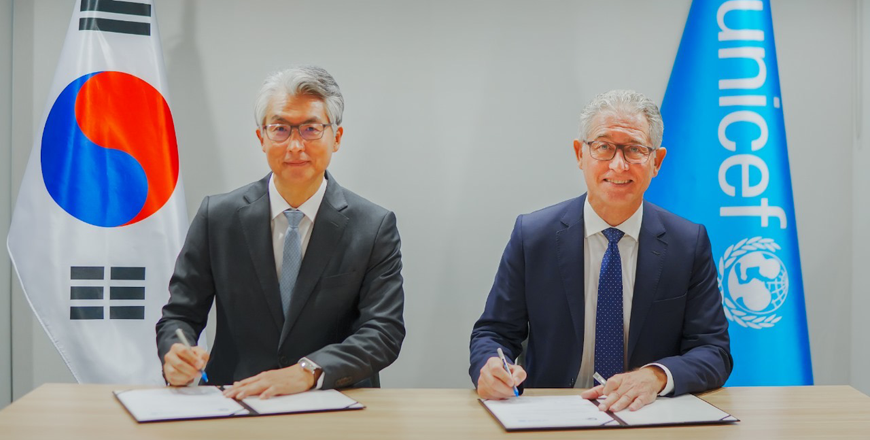You are here
Schadt salutes Jordan’s role in hosting Syrian refugees
By Elisa Oddone - Mar 02,2014 - Last updated at Mar 02,2014
AMMAN — Jordan and other countries in the region are doing a “remarkable job” in absorbing the waves of Syrian refugees, but more should be done to stabilise the situation inside Syria, Germany’s first lady said in an exclusive interview with The Jordan Times.
UNICEF Ambassador Daniela Schadt arrived in the Kingdom on Friday for a two-day visit to meet Syrian children who found sanctuary in host communities and the Zaatari camp, the country’s largest refugee camp.
“Jordan is carrying on an immense performance especially considering the large number of refugees living in the country, its lack of natural resources and water,” she said.
“It is as if Germany — whose total population is around 82 million — would give shelter to 8,000,000 refugees.”
Jordan, Lebanon, Turkey and Iraq have taken in the majority of the 2.2 million Syrian refugees, with around 600,000 of them living in the Kingdom, according to UNHCR figures.
But the UN refugee agency’s number includes only officially registered refugees and those awaiting registration, and unofficial refugees in Jordan probably amount to one million, according to the government.
More than one million Syrian children, some without parents or close relatives, have crossed into neighbouring countries since the onset of the conflict in March 2011, according to UNICEF.
“I visited some of the 100 child-friendly spaces run by UNICEF in Jordan offering psycho-social support activities,” Schadt, partner of German President Joachim Gauck, noted.
“There, children were busy with their activities, cheerfully playing and doing handicrafts; however there are still too many children both outside and in Syria for whom the situation is still depressing,” she added.
“Problems are of different degrees. There are children who crossed the border on their own after losing their parents while others experienced the shelling and saw dead bodies. All of these are deeply traumatic experiences.”
The former journalist said that from her European perspective, having to pack her bag and flee the country, not knowing what was to become of her would be “highly traumatising” and almost “unimaginable”.
“This is an extremely distressing situation for an adult. For a child, then, it becomes unbearable especially considering the direct war experience [he/she] might witness,” Schadt said.
In host countries young refugees are vulnerable to exploitation like early marriage, domestic violence and child labour, despite efforts to keep them in school, according to UNICEF.
In Jordan some 200,000 Syrian refugees are of school age, but only 80,000 are enrolled in education, often in classrooms with double shifts while an estimated 30,000 Syrian children are working in Jordan, UNICEF figures show.
“Child-friendly spaces are an important service to Syrian children which must be strongly supported,” as there are few other options to alleviate their trauma and internal suffering, Schadt said, adding that she was satisfied with the 10 million euros in aid Germany recently pledged via UNICEF.
According to Germany’s first lady, humanitarian agencies should focus their efforts on family units to prevent children from experiencing domestic violence and exploitation.
“We must provide each family member with psychological support. It is very hard to tackle these problems amid a crisis without external support, therefore we should not leave families alone. They are all in desperate need of help.”
Proposing a long term solution to tackle child labour, Schadt suggested introducing more vocational education in the country to ensure a future for the current generation of Syrian children even long after the ceasefire.
“We should make sure children receive appropriate training for future jobs. Of course, this would not help the families’ income immediately but it would in the future and also in a more sustainable way, giving the youth self confidence and hope.”
Schadt highlighted the fundamental role played by the international community within the ongoing negotiation process to face the humanitarian crisis inside and outside Syria.
“The international community should keep offering support to refugee-hosting countries but also try to make sure Syrians would not anymore feel the need to flee their country in the near future,” she said.
“I learnt during my visit that all refugees look forward to going home but unfortunately the conflict prevents them,” Schadt added.
“We should ensure that people in Syria get access to healthcare and supplies and secure humanitarian corridors, thus enabling relief agencies to enter the conflict zones. We must stress again and again the importance of these corridors within the negotiation process.”
Related Articles
Her Majesty Queen Rania on Sunday met with Germany’s First Lady Daniela Schadt who is visiting Jordan with the purpose of supporting the Kingdom’s efforts in hosting Syrian refugees and checking on the different services they are being offered.
Germany’s minister for economic cooperation promised 25 million euros in additional humanitarian aid to Jordan on Monday while calling for a coordination meeting in Brussels to better channel international aid amid a sprawling refugee crisis.
AMMAN — UNICEF has welcomed the $1 million contribution from Korea to sustain critical water, sanitation, and hygiene services as well as ch














